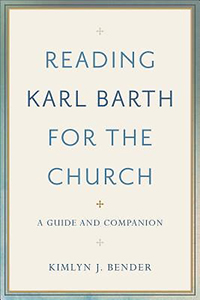Reading Karl Barth for the Church: A Guide and Companion
By Kimlyn J. Bender (Baker Academic)
For ages, book lovers have held to the maxim: “Don’t judge a book by its cover.” Kimlyn Bender, a professor at Baylor University’s Truett Theological Seminary, means to turn this nugget of sage advice on its ear with his latest book, Reading Karl Barth for the Church. In fact, he emblazoned the distinguishing feature of his book right on its cover. This book is “for the church.”
 Karl Barth’s theology has enjoyed a resurgence among conservative seminarians, as well as 20-something and 30-something Christian intellectuals. Despite this renewal, most of the secondary Barth literature clearly has the academy as the target demographic. Bender sets himself and his book apart from this trend by clinging to Barth’s perception of his own work. Barth considered himself, even in his teaching career, a pastor. When he wrote, Barth wrote for the church. Bender simply follows suit.
Karl Barth’s theology has enjoyed a resurgence among conservative seminarians, as well as 20-something and 30-something Christian intellectuals. Despite this renewal, most of the secondary Barth literature clearly has the academy as the target demographic. Bender sets himself and his book apart from this trend by clinging to Barth’s perception of his own work. Barth considered himself, even in his teaching career, a pastor. When he wrote, Barth wrote for the church. Bender simply follows suit.
Bender makes his objective clear. He hopes to introduce Barth’s theology to his readers and begin to help the reader think about their own theology with the same depth of engagement. Each chapter of Bender’s book corresponds to a section of the first volume of Barth’s Church Dogmatics. Bender brings his wealth of insight and research from his time at the Center for Barth Studies at Princeton Theological Seminary to this current volume. Each chapter provides what Bender describes as a guided tour through Barth’s original text. In these sections, he removes common obstacles to reading Barth for both the novice and theological student alike. After each “tour” concludes, Bender adds his own insightful commentary, in which he restates Barth’s point in more modern language and links that point to the current state of the church. Bender’s desire for this volume to serve the church comes through as he concludes each chapter with a “questions for reflection” section clearly meant to aid a small-group study.
I found Bender’s insights into Barth’s theology—specifically the structure of Barth’s call and response to his own questions, as well as the questions of other theologians—especially moving. Bender plainly handles Barth and the mountains of secondary literature in a way that creates a clearly defined path to follow. In fact, one of the book’s many strengths lies in Bender’s ability to write based on his own authority, reducing the need for pages overflowing with footnotes. Bender writes a well-organized and linear commentary to the Church Dogmatics on visually clean pages that prove a welcome respite from Barth’s own looping and symphonic style. Despite Bender’s best efforts, the novice may find some passages remain elusive, but that probably owes more to the original subject matter than to any flaw in Bender’s writing.
If you always wanted to read Barth, or if—like so many of us—you tried and failed to read Barth with any comprehension, then I encourage you to judge Bender’s book by its cover. Bender provides a vehicle to ask why interest in Barth has remained secluded from the church, and perhaps even cause some to question why they stayed away from Barth in the first place. He reminds us Barth never meant his writings for the academy. Rather, Barth wanted to present a “full and comprehensive account of the Christian faith … written for the universal church” (p. 31). Bender captures that desire for the church and provides her with a tremendous resource and link back to one of her greatest theologians.
J.R. Watkins, student
Dallas Theological Seminary















We seek to connect God’s story and God’s people around the world. To learn more about God’s story, click here.
Send comments and feedback to Eric Black, our editor. For comments to be published, please specify “letter to the editor.” Maximum length for publication is 300 words.